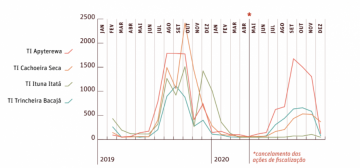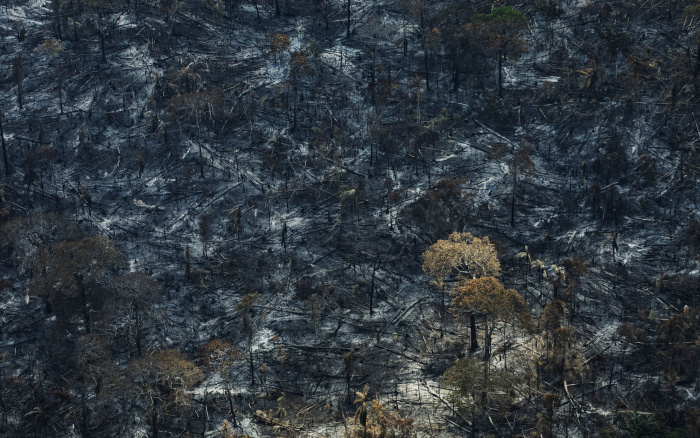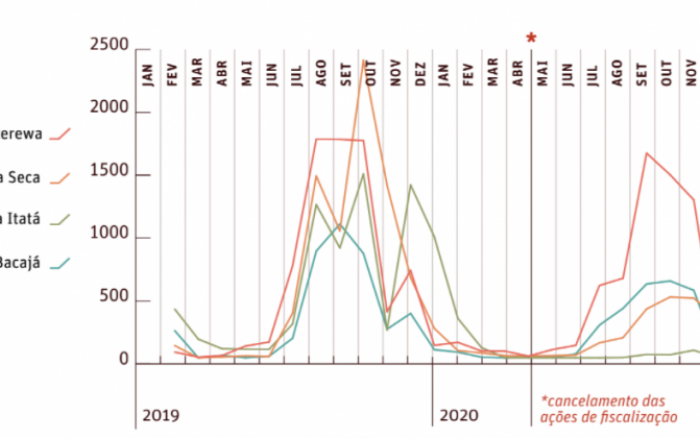Você está na versão anterior do website do ISA
Atenção
Essa é a versão antiga do site do ISA que ficou no ar até março de 2022. As informações institucionais aqui contidas podem estar desatualizadas. Acesse https://www.socioambiental.org para a versão atual.
Land grabbing is the main cause of deforestation in the Xingu basin
quarta-feira, 12 de Maio de 2021 
Boycott to the enforcement actions
Champion of deforestation
"Hunting the indigenous"
Esta notícia está associada ao Programa:
The Bill 510/2021 can be voted in the Senate plenary; known as “PL da Grilagem”, it intends to regularize thousands of hectares illegally deforested in the Amazon; at the top of the ranking of the most deforested Indigenous Lands, Apyterewa and Trincheira Bacajá (PA) face boom in invasions
An illegal road of more than 40 kilometers runs through the Apyterewa and Trincheira Bacajá Indigenous Lands (IL), in Pará, along which more than 745 hectares (ha) of forest were destroyed between June 2019 and February this year. The advance of invasions and the boycott to field inspections put the integrity of the forest and the indigenous peoples at risk, a situation that may be aggravated by the vote on Bill 510/2021, the “Land-grabbers law”, which is was discussed in a public hearing promoted by the Environment Commission on Monday (10).
“The most critical cases of deforestation in the Xingu basin are related to land speculation, and the approval of Bill 510/2021 would be confirmation that crime pays off. In practice, the measure regularizes thousands of hectares that were illegally deforested in the Amazon”, comments Biviany Rojas, coordinator of ISA's Xingu program.
Between January and February this year, 125 and 127 hectares were deforested in Apyterewa and Trincheira Bacajá, respectively, "as part of a major land grabbing scheme in the region," according to Rojas. These two Indigenous Lands are connected by the same invasion front that is getting closer and closer to the communities: only two kilometers separate the Kenkro village from an invasion spot in the southern portion of the Trincheira Bacajá IL.
From their village, the Xikrin people can hear the sound of chainsaws and tractors advancing over their territory. The same happens at Apyterewa, according to reports by the Parakanã, who, in addition to the sounds of the invasions, denounce that the rivers are contaminated by illegal mining - the second largest vector of deforestation in the basin.
The data are from Sirad X, the deforestation monitoring system of the Xingu + Network, an articulation of indigenous, riverine and civil society organizations for the defense of the rights of the Xingu peoples.
Boycott to the enforcement actions
Added to the expectation of legalization of illegally occupied government land, the federal government has weakened the performance of the environmental agencies.
Operations carried out by Ibama between November 2019 and April 2020 in the Ituna Itatá, Cachoeira Seca, Trincheira Bacajá and Apyterewa Indigenous Lands managed to reduce deforestation. The rates, however, went up again after the cancellation, still not justified, of the field operations and the exoneration of the responsible coordinators in April of last year. Of the 3 hectares deforested in May 2020 in the Trincheira Bacajá, for example, deforestation jumped to 411 hectares in December, an increase of 12,980%. In the following months, between September and December, another 1,847 ha were deforested in this IL. In Apyterewa, deforestation increased by 393% in the month following the suspension of operations, and continued to grow: between July and December, 5.8 thousand hectares were deforested, 1,287% almost 14 times more than the total deforested between January and June.

Last year, the Apyterewa and Trincheira Bacajá ILs were at the top of the ranking of the most deforested in the Amazon, along with Cachoeira Seca and Ituna Itatá ILs, also located in the Pará portion of the Xingu basin.
A survey of the Xingu + Network revealed that in the last three years, under Bolsonaro, 66,500 hectares have been deforested in the Xingu basin ILs. From October 2018, deforestation began to intensify, and in 2019, this trend has consolidated, as a result of invasions, theft of wood, illegal mining and land grabbing. [Access the special "Xingu under Bolsonaro"]
Champion of deforestation
In Apyterewa Indigenous Land, the most deforested in Sirad X's three years of monitoring, a land grabbing scheme was revealed by which new invaders are installed inside the IL in lots sold or donated irregularly. The logistical support site is Vila Renascer, a village that emerged in 2016 within the IL, 11 years after its approval. [Know more]
Besides conflicts due to land grabbing, the region has also faced, in the last two years, the advance of illegal mining with the confirmation of the opening and operation of illegal gold mines within the territory.
Home to the Parakanã people, this IL is located in the area of influence of the Belo Monte Hydroelectric Plant. The removal of illegal occupants and the implementation of a protection plan is part of environmental conditions to the licensing of this hydroelectric plant, and should have been implemented in 2011, prior to its installation. Ten years later, the effective implementation of the plan, however, has not happened yet.
"Hunting the indigenous"
Land grabbing in IL Trincheira Bacajá peaked in August 2019, when more than 1,100 hectares were deforested. That same month, Xikrin leaders were threatened by a group of invaders in the southeastern region of the IL who said that they were going to “hunt the indigenous”. [Know more]
There are at least three active invasion fronts and according to the Xingu + Network, they act in a coordinated manner. In the north and northeast, 3,794 hectares were deforested between 2018 and 2020, in the southwest region, 854 ha, and in the southeast region, the most intensely deforested and the stage of conflict between invaders and indigenous peoples, 3,861 ha of forest were destroyed in the period.
In June 2020, a request was made for the removal of invaders from the Trincheira Bacajá as one of the emergency measures requested in the Argument of Non-Compliance with Fundamental Precept (ADPF) submitted by Apib to the Supreme Federal Court (STF). Still, illegal activities in the area continue. From July to December 2020, more than 2,500 hectares were deforested in the IL.
Isabel Harari
ISA
Imagens:





